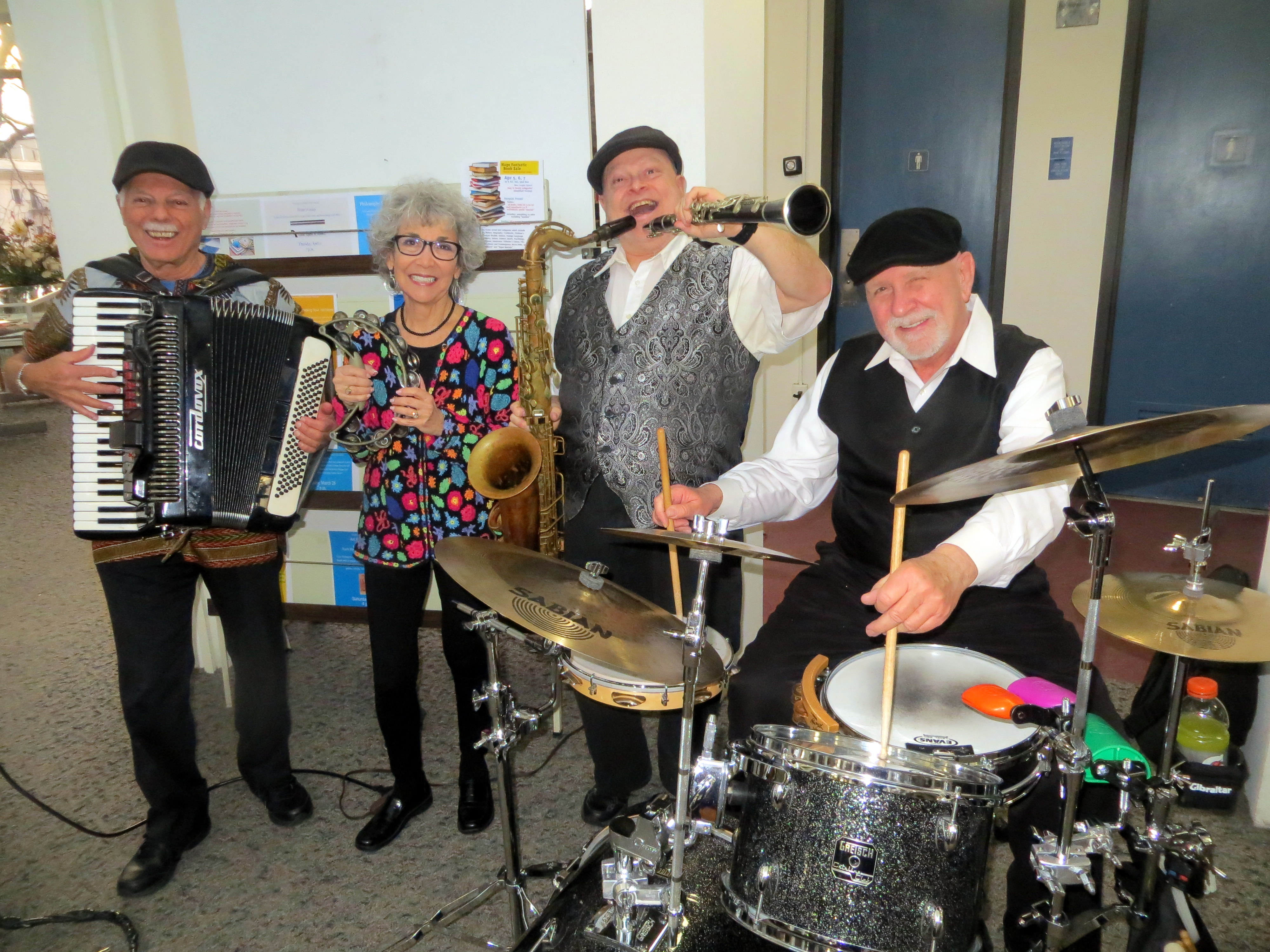
BY HILLARY VIDERS
SPECIAL TO NORTHERN VALLEY PRESS
ENGLEWOOD, N.J.—It was Vunderlekh! (That’s Yiddish for “Amazing!”)
On March 24, the Odessa Klezmer Band performed at the Englewood Public Library with all the foot stomping and hand clapping energy of a traditional Eastern European Jewish wedding. An exuberant ensemble of musicians rendered joyful renditions of traditional Jewish music.
With a record attendance, both the library’s entire main room and second floor were filled with a huge audience that smiled, sang along and clapped wholeheartedly. Some people even danced in the aisles—between the book stacks!
Klezmer music, is in fact, music made for dancing, usually at weddings and other celebrations. It is a tradition that dates back as far as the 16th century.
Klezmer is the musical culture of the Ashkenazi Jews of Eastern Europe. It now refers to the musical genre that is a type of secular Jewish music played by professional musicians called klezmorim in ensembles known as kapelye. The genre originally consisted largely of dance tunes and instrumental display pieces.
The early klezmorim played primarily for Jewish weddings, although they were also hired for other Jewish and non-Jewish events. Jews lived under a variety of everchanging legal restrictions in Europe which affected when and where the klezmorim could work.
As the Jewish people moved throughout Central and Eastern Europe, the music was influenced by local cultures. There are strong Middle Eastern roots which can also be heard in Jewish liturgical music. Other major influences came from Romania, Russia, the Ukraine, and Bessarabia.
In the United States, the genre evolved considerably as Yiddish-speaking Jewish immigrants from Eastern Europe who arrived between 1880 and 1924 came into contact with American jazz.
With the assimilation of Jews into mainstream American culture after World War II, klezmer music fell out of favor in the Jewish community. It was only in the 1970s, as an extension of the folk music revival, that a new group of musicians began to rediscover klezmer music. Additionally, later immigrants from the Soviet Union took their surviving repertoires to the United States and Israel in the 1980s.
Today, this lively and soulful music is now more popular than ever, being performed and taken in new directions by bands all over the world.
The Odessa Klezmer Band, under the direction of Ed Goldberg, has been playing klezmer for the last 22 years. Goldberg was brought up playing Eastern European and polka music in Elizabeth, N.J., and for 25 years, he toured with the band of Jimmy Sturr, an 18-time Grammy award winning polka artist.
The Odessa Kelzmer Band, formed in 1984, has played numerous festivals, gypsy affairs, weddings, bar mitzvahs, concerts, TV shows, and dance dates throughout the region.
The band’s March 24 performance at the Englewood Library reverberated with exciting melodies. The concert began as multi-instrumentalist Steve Kaplan descended the stairway from the second floor to the main lobby playing the flute and comically interacting with audience members, eliciting peals of laughter.
After a brief introduction by Goldberg, the group plunged right into an hour of musical joy.
Kaplan, who has been playing saxophone and clarinet for 45 years, said, “Being Jewish and having a father who played swing on saxophone, I grew up loving the energy and joy of music. Our band has had a ball with some of our gigs.
“We did a 15 block procession on the boardwalk of Atlantic City when their temple celebrated their new Torah,” he said. “It was a wild scene!”
There was plenty of that love at the Englewood library performance as the band performed numerous melodies of Russian, Sephardic Jewish and gypsy origin. A standout was their medley from “Fiddler on the Roof,” an original rendition that they first played at the 50th anniversary of the Broadway play.
Throughout the performance, Goldberg narrated humorous anecdotes about their experiences, and Kaplan snaked around the room with his sax for close ups with the audience.
“The thing that is so special about klezmer,” Goldberg said, “is that it is universal. Everyone finds it uplifting and you don’t have to be Jewish to enjoy it!”
The band enjoyed a standing ovation as they finished their hour set, and then delivered a 20-minute encore, to the delight of the audience.
